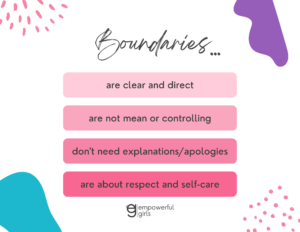
Boundaries Refresher
Before we launch into boundaries crossing, let’s refresh your memory. Back in episode 22 we talked about holding our boundaries and saying No (instead of saying Yes and people pleasing) when someone asks us to do something we don’t want to or don’t have time for . As a refresher, Brené Brown explained boundaries simply as “what’s okay and what’s not okay.” Like what works for you, and what doesn’t.
Boundaries apply to more than time, according to Positive Psychology there are seven types of boundaries: time, as we’ve discussed; physical, like personal space, your body and privacy; mental, your opinions and values; emotional, availability or capacity; material, like letting people borrow money or your stuff; conversational, like topics you will or won’t talk about; and internal, like energy (think introvert vs. extrovert). Sometimes we assume people ought to know what our boundaries are without us sharing them, and that’s usually when boundary issues arise because they haven’t been clearly drawn. I also think there’s a common misconception that boundaries are mean, but they’re really not–you can state your boundaries and be direct without being unkind. If someone doesn’t like your boundaries, that doesn’t make you mean. Holding your boundaries is a form of self care, and it’s important to prioritize yourself and your needs by asserting your boundaries with people.
Boundaries Crossing
But what happens when someone gets too close to or even crosses your boundaries, specifically your physical boundaries? These situations can be uncomfortable because your choices are either, you don’t say anything about it and things will for sure get awkward, or you do say something about it and things might get awkward. Seems like a lose-lose situation, but it actually doesn’t have to be. Let’s explore the second scenario some more.
Boundaries Crossing: What To Do
What do you say or do when someone does something that crosses your physical boundaries? For example,a friend keeps tickling your stomach, someone touches your hair, a relative always goes in for a hug, or your significant other wants more affection–and you don’t want any of those things. You could start by drawing your boundary line, clearly stating what’s okay/not okay with you. To your friend say, “Hey I’d rather not be tickled, please stop.” To the classmate, “Oh I actually don’t like when people touch my hair.” To your relative, “No thanks, instead of a hug, how about we fist bump?” To your significant other say, “Honestly I’m comfortable staying where we’re at with affection.” Usually people catch on after that. You don’t have to give an explanation, even if someone asks why, because your boundary is how you feel/what works for you/what you’re comfortable with. Your boundaries aren’t up for debate and don’t need someone else’s approval. If you’re feeling generous you could acknowledge how they feel, “I can sense you feel frustrated, but I appreciate you understanding,” “I get that this is not what you want, but this is what I need.” Also, you don’t have to say sorry for setting a boundary. You didn’t do anything wrong, no need to apologize for having boundaries–everyone has them.
Continued Crossing: What To Do
Sometimes people may need a reminder about your boundaries and hopefully they will acknowledge when you restate your boundary. But if they blatantly ignore the boundary you set and keep doing what you said you’re not okay with, continued unwanted behavior is harassment. In that situation, OR even if their first boundary crossing is a glaring boundary violation (inappropriate touch), set a firm boundary. “No.” “Stop that.” “Don’t touch me.” That’s not being mean, that’s being direct–there’s a difference. You can also use body language to emphasize your message, hold up your hand to show a “stop” signal, look them right in the eye, move back and put some distance between you. Frankly you saying “No,” “Stop,” or “Don’t” should be clear enough for them to understand your boundary, though.
Boundaries Pushback
Now there’s a chance that the person you shared your boundary with will not like it. Instead of being accountable for their actions and respecting your boundary, they may react with pushback a few different ways. They may deny they did anything wrong, say that you’re confused. Or they may tell you to calm down, you’re overreacting, they were only kidding, it’s not a big deal–when in reality it IS a big deal to you. This tactic is called gaslighting. It’s a deflection because they feel awkward that you drew your boundary and they don’t want to deal with it, so they try to make you feel dumb for treating their boundary crossing as serious as it is for you.
Another reaction they may have to you sharing your boundary is to question your relationship like, “I thought we were friends,” “But we’re family,” “Don’t you care about me?” “If you loved me, then you would ___.” This tactic is called manipulation. Getting what they want, even if that makes you feel uncomfortable, is more important to them than respecting you, so they try to guilt you into giving in.
Sometimes people may react to your boundaries with a counterattack, turning the blame on you to make you feel wrong for drawing a boundary so that you’ll remove it. They are so set on getting their way, and they may even make your relationship conditional on your compliance. “If you don’t ___, I’m not going to …” (a negative consequence). This is not them setting a boundary, this tactic is called coercion. Remember, boundaries are about you and what you will/won’t do, they aren’t about controlling other people–that’s what this coercion tactic is trying to do.
Pushback: Things to Remember
So how do you deal with a boundaries pushback? You need to remember a few things before you respond. First, remember that other people don’t get to minimize how important your boundaries are to you. Just because they may have different boundaries for what’s okay with them doesn’t mean yours are wrong. Again, your boundaries are about you. Second, you are not responsible for other people’s feelings. This doesn’t mean you can say whatever you want to people. It means that when you clearly state your boundaries, you don’t “make” people feel sad or angry. How they react is their choice. As much as you would like someone to accept your boundaries, you can’t control how they react; that’s on them. Third, quoting Maya Angelou, “When people show you who they are, believe them.” This doesn’t mean people can’t change, you should judge everyone, and forget about forgiveness. What it means is, if someone won’t show you respect, if they’re a source of stress in your life, if they’re making your relationship unhealthy or toxic, stop making excuses for them and giving them more chances than they deserve. You can’t change them. You can only control what you do in this situation. Lastly, and most importantly, you deserve respect. Bodily autonomy is a fundamental right for everyone. Your physical boundaries should be honored, just as you should also honor others’ boundaries.
Pushback: What You Can Do
So what can you do when someone gives you pushback for your boundaries? You could share how you feel, like “I feel uncomfortable/not heard/disrespected.” You can restate your boundary with a future consequence, “I don’t like when people touch my stomach, and if it continues I’m going to leave.” You could skip to this next one if it feels right–just leave. Remove yourself from the situation. Go hang out with someone else. Give yourself some space, distance, and time. Go write down what happened and when, in case you need to reference it later. You could also leave to go tell a trusted adult what’s going on so they can help you handle this situation. I recognize that certain circumstances may be more complicated than my examples. Whatever the relationship may be, if your gut is telling you something is wrong, if you feel unsafe or in trouble in any way, do whatever you need to reach someone who can help. You do not have to stay in a situation or continue a relationship where any of your boundaries are continually crossed. Uphold your boundaries and assert yourself.
Boundaries are not mean or controlling. Boundaries do not need to be explained or apologized for. Boundaries are clear and direct. Boundaries are about respect and are a form of self-care.
Boundaries Poster Printable
To help you with this, I created a “Boundaries “ poster for you to print out, personalize, and post on your wall where you’ll see it, remember it, practice it, and believe it — that’s the important part.
Resources:
Here are some resources for parents about setting boundaries:
Set Boundaries, Find Peace, by Nedra Glover Tawwab
The Set Boundaries Workbook, by Nedra Glover Tawwab
The Book of Boundaries: Set the Limits That Will Set You Free, by Melissa Urban
And if you have a topic suggestion, I’d love to hear from you! Send an email (tweens get the OK from your parents) to hello@EmpowerfulGirls.com .
If you have social media already, follow me on Insta or tiktok @empowerfulgirls. I’m not encouraging or endorsing social media, but I’m on there to offer an unfiltered, uplifting alternative to what’s in your feed. Remember to get on the email list for the newsletter!
Also, if you enjoy listening to 10 for Teens + Tweens, I would truly appreciate you telling your friends about this podcast or leaving a review so others can find it and feel uplifted, too! Your support means the world to me!
